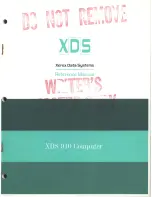
SYS_printf
Application Program Interface
2-459
A dash (-) symbol causes the converted argument to be left-justified
within a field of width characters with blanks following. A 0 (zero) causes
the converted argument to be right-justified within a field of size width with
leading 0s. If neither a dash nor 0 are given, the converted argument is
right-justified in a field of size width, with leading blanks. The width is a
decimal integer. The converted argument is not modified if it has more
than width characters, or if width is not given.
The length modifier l can precede %d, %u, %o, and %x if the
corresponding argument is a long integer.
SYS_vprintf is equivalent to SYS_printf, except that the optional set of
arguments is replaced by a va_list on which the standard C macro
va_start has already been applied. SYS_sprintf and SYS_vsprintf are
counterparts of SYS_printf and SYS_vprintf, respectively, in which output
is placed in a specified buffer.
Both SYS_printf and SYS_vprintf internally call the function SYS_putchar
to output individual characters via the Putc function configured in the SYS
Manager Properties. The default Putc function is _UTL_doPutc, which
writes a character to the system trace buffer. The size and memory
segment for the system trace buffer can also be set in the SYS Manager
Properties. This system trace buffer can be viewed only by looking for the
SYS_PUTCBEG symbol in the Code Composer Studio memory view.
Constraints and
Calling Context
❏
The function bound to Exit function or any of the handler functions
are not reentrant; SYS_exit must be called atomically.
See Also
















































